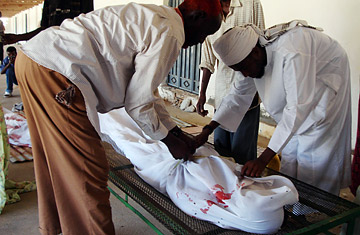
Somalians prepare the body of a man killed in clashes on the streets of Mogadishu during heavy fighting between insurgents and Ethiopian troops on April 21, 2008.
Even by the standards of Somalia, a country gripped by chaos for 17 years, it has been a horrible couple of weeks. First came the killings of two British Somali teachers and their Kenyan colleagues, all said to have been shot in the head. Then pirates waylaid a French yacht traversing the country's territorial waters. And now, renewed fighting in Mogadishu has killed at least 100 people and driven thousands more to join the country's swelling refugee population — already estimated at more than 1.5 million. Meanwhile, aid groups have found themselves targets in the fighting across the country, from the north, where foreign reporters and volunteers have been held for ransom by gangs, to the south, where they've been executed to show the low regard their Islamist captors have for the West.
What's going on? No doubt some of the violence can be blamed on the general chaos that has gripped Somalia in the 17 years since it last had a functioning government, the dictatorship of Mohamed Siad Barre. But there are also fears that recent fighting, and especially the latest in Mogadishu, are signs that Somalia is entering its bleakest chapter yet.
A brief lull followed the invasion by Ethiopian troops on Christmas Eve, 2006 (at the "invitation" of the feeble U.S.-backed Transitional Federal Government, or TFG), but recent months have seen a comeback by the radical Islamic groups that had asserted control over parts of the shattered country. Reports from the region suggest that the fundamentalist fighters will capture a town in a lightning raid and then retreat, more to show off their muscle than anything else. According to witnesses, the fighters behind these raids belong to the al-Shabab, a band of mostly young men who adhere to Taliban-style Islamic codes.
The al-Shabab used to be the military wing of the Islamic Courts Union, the group of Islamic militias that had taken over towns across the country before being ousted by the Ethiopians. Now, however, they appear to be gaining power, raising fears that moderates among the Islamic groups are being sidelined. "What has been happening is the steady deterioration in the security situation and the inability of the TFG and the Ethiopian forces to contain the insurgency and impose some sort of stability," Andebrhan Georgis, an adviser to the Africa Program at the International Crisis Group, told TIME. "I'm afraid what we're seeing is increasing radicalization."
That's been a major embarrassment to Ethiopia and, by extension, the United States, which supported Ethiopian Prime Minister Meles Zenawi's decision to invade, on the premise that it would quell the deepening Islamic fundamentalism that seemed to be taking hold. So far, events in Somalia suggest that it has had the opposite effect, driving moderate factions of the Islamists out of the country and shifting power to the best-armed and most hardline among them.
The most troubling evidence of this came earlier this week, when the Alliance for the Re-Liberation of Somalia, an Eritrea-based umbrella group that includes many of the Islamists, said it was no longer prepared to talk about negotiating with Somalia's new Prime Minister, Nur Hassan Hussein. Hussein had brought a hint of hope for Somalia's future with a promise to negotiate with the Islamists. But now, amid the latest fighting and allegations of rights abuses by Ethiopian troops, those tentative hopes seem to have been crushed. "We are not going to talk to with the Ethiopians and the [Somali government] right now because they are the same," Ahmed Abdallah, spokesman for the Alliance for the Re-Liberation of Somalia, told TIME. "There is no reason for Ethiopia to stay in Somalia for one more hour. If they leave, the peace process can take hold."
Almost forgotten but looming in the background is the civilian suffering that has made Somalia one of the world's greatest and most ignored humanitarian disasters. Instead, attention has lately focused on U.S. fears that Somalia will become the next al-Qaeda training ground or the vanguard of a new Islamic fundamentalist movement that will sweep Africa. The U.N. World Food Programme is already feeding about 1.5 million people, while the International Committee of the Red Cross and the aid group CARE are feeding many others. As if matters could not get any worse, the country is on the brink of a severe drought. "The situation is clearly getting worse, and with predictions for the coming rainy season not being positive, we are looking at a major crisis," said Marcus Prior, the Nairobi-based spokesman for the World Food Programme. "We're doing everything we can to make sure we have the capacity to respond to significantly more numbers than we're already targeting."
